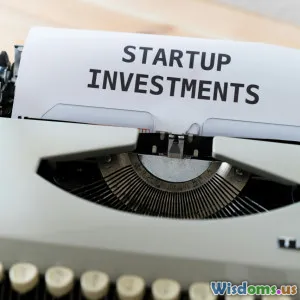
Challenging Myths About Entrepreneurship That Hinder Startup Growth
9 min read Debunk common entrepreneurship myths that stall startups and reveal truths to accelerate growth and success. (0 Reviews)
Challenging Myths About Entrepreneurship That Hinder Startup Growth
Entrepreneurship is often portrayed through a prism of glamour, glamourized successes, and simplistic narratives that can mislead aspiring startup founders. While stories of overnight billionaires or brilliant inventions dominate the discourse, they cloak the gritty realities and nuanced dynamics that govern startup growth. Unfortunately, many of these pervasive myths act as invisible shackles, preventing entrepreneurs from making informed decisions and stunting their ventures’ potential.
In this article, we'll dissect some of the most persistent misconceptions about entrepreneurship, backed by real-world examples and research, with the aim to clear the fog for aspiring and current startup founders. Understanding these myths and the truths behind them isn’t just about debunking old stories; it’s essential for cultivating resilience, strategic thinking, and growth.
Myth 1: Entrepreneurship Means Taking Huge Risks
One of the most deeply rooted beliefs is that entrepreneurship is synonymous with reckless risk-taking—a high stakes gamble with either a fortune or failure at the end.
The Reality: Successful entrepreneurs often emphasize calculated risk, not reckless risk. According to a study from the Kauffman Foundation, while startups inherently carry risk, effective entrepreneurs assess and mitigate risks through market research, pilot programs, and gradual resource allocation.
Take Sara Blakely, founder of Spanx. Blakely famously started with $5,000 in savings and invested conservatively by testing her products directly with consumers before stepping into full-scale operations. She strategically minimized upfront financial risk while continuously validating her product-market fit.
Why this myth hinders growth: Believing that one must bet the farm to succeed can lead to either paralyzing fear of failure or impulsive decisions. Entrepreneurs need to understand that starting lean and being strategic with resources is not only safer but often more effective.
Myth 2: You Need a Completely Original Idea to Succeed
The myth of the “innovative genius” who discovers some groundbreaking product or service out of nowhere pervades startup culture.
The Reality: Most successful startups build upon existing ideas and improve them significantly. Innovation often comes through iteration rather than invention. For instance, Uber didn’t invent the taxi— it reimagined accessibility and service delivery using technology.
Amazon didn't invent online retail but redefined logistics, user experience, and product variety.
Research published in the Harvard Business Review indicates that startups succeeding through incremental innovation or business model innovation often experience more sustainable growth.
Why this myth hinders growth: Obsessing over ideas that haven’t been done before can delay market entry or cause entrepreneurs to overlook opportunities for improvement in established sectors. Accepting that innovation can be evolution enables faster development and competitive advantage.
Myth 3: You Must Scale Fast to Attract Investors and Gain Market Share
The media celebrates startups that achieve rapid scaling and enormous valuations within months, cultivating the impression that speed is paramount.
The Reality: While time-to-market matters, uncontrolled rapid scaling without strong foundational management can doom startups. Examples like WeWork show how rapid expansion paired with weak governance led to valuation collapse.
A report from the Startup Genome Project reveals startups that evolve more in their first 12 months (adjusting product and customer focus before scaling) increase their survivability by up to 30%. Scaling prematurely often leads to resource crashes and customer dissatisfaction.
Why this myth hinders growth: Entrepreneurs might overstretch their teams or burn resources chasing growth rather than building robust operations, weakening sustainability.
Myth 4: Entrepreneurs Are Lone Wolves Who Must Do Everything Themselves
The popular image is the charismatic solo founder battling adversity alone.
The Reality: Collaboration and a supportive network are critical ingredients for startup success. According to a KPMG survey, startups that engage mentors, advisors, and diverse teams demonstrate higher growth and innovation.
Take Airbnb founders— their initial success built heavily on collaboration, diverse expertise, and early advice from investors and accelerators.
Why this myth hinders growth: Entrepreneurs attempting to solve all challenges alone might face burnout or miss out on valuable perspectives, partnerships, and skills vital to growth.
Myth 5: Failure Means You’re Not Cut Out For Entrepreneurship
Failure is depicted as defeat rather than an essential part of the entrepreneurial journey.
The Reality: Failure is almost universal and serves as an important learning process. Edison famously said, "I have not failed. I've just found 10,000 ways that won't work." Many successful entrepreneurs, like Steve Jobs or Elon Musk, faced public setbacks before their eventual achievements.
Research in the Journal of Business Venturing emphasizes that entrepreneurs who learn from failure significantly improve their decision-making and odds of success in subsequent ventures.
Why this myth hinders growth: Fear of failure may prevent entrepreneurs from taking necessary pivots or even pursuing their ideas aggressively.
Myth 6: You Must Have a Business Degree or Formal Training
The stereotype is that entrepreneurial prowess requires formal business education.
The Reality: Many of the world’s most successful entrepreneurs had no formal business training. Consider Richard Branson or Mark Zuckerberg; their success hinged on vision, adaptability, and execution.
That said, continuous learning—whether from experience, courses, mentors, or books—is fundamentally important. Entrepreneurship education is evolving to practical, hands-on approaches rather than purely academic.
Why this myth hinders growth: Potential founders might self-select out of entrepreneurship due to a lack of formal education, depriving startups of fresh perspectives and talents.
Conclusion: Embracing Reality to Empower Startup Growth
Disentangling myths from the realities of entrepreneurship is essential for creating more successful, sustainable startups. These misleading narratives often discourage action, foster poor decisions, or encourage risky moves that don't pay off.
Aspiring entrepreneurs should embrace the truth that entrepreneurship is an iterative, rigorous, and collaborative endeavor. It requires strategic risk management, openness to learning, incremental innovation, and building resilient business models rather than chasing myths of instant success or lone brilliance.
By grounding our understanding in reality and learning from the experiences of successful startup founders across industries, we can nurture growth environments where startups don’t just survive, but thrive in the long haul.
Take Action: Reflect on any beliefs you hold about entrepreneurship — which are myths? Challenge them and align your strategy with evidence and tested insights. Remember, a myth-free mindset is the springboard to more deliberate, effective growth and innovation.
References and Recommended Reading:
- Kauffman Foundation Reports on Startup Risk Management
- Harvard Business Review: Incremental Innovation in Startups
- Startup Genome Project: The Impact of Premature Scaling
- Journal of Business Venturing: Learning from Failure
- KPMG Survey on Startup Growth and Networks
Quote credits: Thomas Edison, Steve Jobs, Elon Musk
Rate the Post
User Reviews
Popular Posts
















